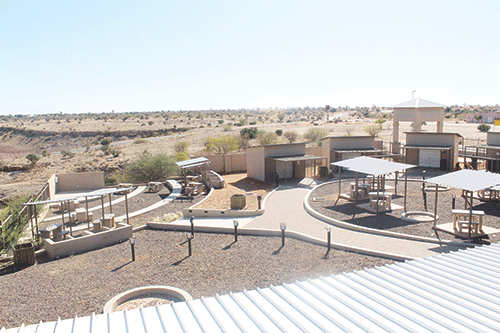Government has through the Namibia Industrial Development Agency invested around N$1 billion to construct 148 industrial parks and business complexes, but only 118 are operational.
The 30 which remain dormant are mainly due to tenants’ failure to honour their financial obligations as far as paying rental fees is concerned, said Nida spokesperson Wessel Nanuseb.
Nida is the custodian of the parks, some of which were built by the trade ministry itself.
“Our facilities are spread across all 14 political regions, encompassing towns, villages and settlements throughout the country. A total of two projects remain incomplete due to budgetary constraints, with completion awaiting the availability of funds,” he added.
Running the business parks and complexes is not child’s play, Nanuseb observed.
At present, the agency is struggling with tenants occupying these state-of-the-art facilities but failing to meet their monthly rental obligations.
“The primary challenge faced by the agency revolves around tenants neglecting their monthly rental obligations, which in turn hinders Nida from fulfilling its mandate. We continuously urge tenants to fulfill their rental responsibilities,” he stated.
A lot of public money was pumped into the construction of these parks, he said, adding that “the asset base of our facilities surpasses N$1 billion”. Nanuseb then underscored that most of the facilities are operational.
“Considering the extensive infrastructure network across the nation, the majority of our facilities are functional. For those that are operational, they effectively serve their intended purpose of providing a conducive environment for business owners, particularly small and medium enterprises (SMEs), who might lack the capacity to operate elsewhere.”
Hardap
Nanuseb’s statements follow a recent visit by New Era to the Hardap region, where it was found that four business parks are gathering dust, as little to no business activity is taking place. These parks are found in Gochas, Gibeon, Hoachanas and Kalkrand.
High rental fees and bureaucratic obstacles in stall allocations are identified by residents as reasons for these parks’ failure to meet expectations. Frustrated residents claim to have applied for stalls for years without feedback, calling for a fairer allocation process which prioritises committed entrepreneurs.
Young people use the abandoned infrastructure to engage in unlawful activities such as drug and alcohol abuse, with inadequate security contributing to vandalism of the properties.
“If you pass here at night, you will see so many movements of young people entering this place, just to enjoy their life. You will find them smoking and loitering here. This is a waste of government resources,” a Gochas resident said. The Gochas Business Park faces challenges such as disconnected utilities and outstanding debts, exacerbating its decline. The only operational business on-site is a betting shop.
In nearby Gibeon, a state-funded business centre suffers from low occupancy, with only the accommodation facility operational. The park’s remote location limits its visibility and accessibility, hindering business potential.
Residents thus demand action to reduce rental fees, streamline allocations, and select strategic locations to stimulate economic activities in the Hardap region.
The Gochas Village Council’s acting CEO Paulina Eiseb disclosed that inadequate security and supervision have contributed to the vandalism of the property.
“Vandalism has plagued the park due to the lack of security and proper supervision, leaving certain areas, including the supermarket and coffee shop, in ruins,” she said.
The locals stated that they want stalls to be allocated to individuals genuinely committed to driving their businesses to success, as opposed to chance-takers.
Although residents have highlighted several issues, Nida did not provide answers addressing their concerns, particularly an in-depth breakdown of the factors contributing to the non-functionality of over 30 parks in the country.
Contradiction
There appears to be some contradiction in the number of parks provided by the Nida official and Ministry of Trade spokesperson Elijah Mukubonda, who told this publication that at present, there are approximately 46 parks in total across the country, inclusive of industrial parks and SME parks managed by Nida.
“All 46 parks are fully-occupied by local SMEs helping them to establish their businesses by subsidising rent. This has enabled businesses to continue operating during and after the difficult period of the pandemic,” Mukubonda said.
He added that multi-purpose SME building blocks, industrial parks and common facility centres are all functional, despite some which require “minor renovations and are receiving priority”. – ljason@nepc.com.na


